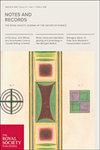Minakata Kumagusu in London: Challenging Eurocentrism in the pages of Nature
IF 0.6
3区 哲学
Q3 HISTORY & PHILOSOPHY OF SCIENCE
Notes and Records-The Royal Society Journal of the History of Science
Pub Date : 2023-11-01
DOI:10.1098/rsnr.2023.0053
引用次数: 0
Abstract
The Japanese biologist and ethnologist Minakata Kumagusu has achieved a degree of celebrity in Japan for being the first Asian contributor to the British scientific magazine Nature . However, although Minakata's many contributions to Nature from 1893 to 1914 provided British readers with rare insight into Asian scientific achievements, he is seldom discussed in history of science scholarship produced by American, British and European researchers. In this article we examine Minakata's Nature articles to gain insight into how his encounter with the Eurocentrism of British culture while living in London from 1892 to 1900 affected his intellectual development. We argue that having his articles published in Nature to gain scientific recognition was not Minakata's real goal. Rather, we demonstrate that his Nature articles were connected to a larger project that inspired Minakata for much of his life, a descriptive sociology of Japan. For this descriptive sociology, Minakata wished to construct a new form of historical analysis that drew on past Asian sources, as well as anthropological and sociological perspectives learned from British philosopher of evolution Herbert Spencer and British anthropologists such as Edward Clodd, Edward Tylor and Andrew Lang. Minakata's writings reveal him to be much more than a conduit of information about Asia. He was also a pioneering global intellectual who demonstrated how Asian science complemented Western science.Kumagusu在伦敦:在《自然》杂志上挑战欧洲中心主义
作为英国科学杂志《自然》的第一位亚洲撰稿人,日本生物学家和民族学家熊谷元方(Minakata Kumagusu)在日本获得了一定程度的名气。然而,尽管从1893年到1914年,米纳卡塔在《自然》杂志上的许多贡献让英国读者对亚洲的科学成就有了难得的了解,但在美国、英国和欧洲研究人员的科学史上,他却很少被提及。在这篇文章中,我们研究了米纳卡塔在《自然》杂志上发表的文章,以深入了解他在1892年至1900年居住在伦敦期间与英国文化的欧洲中心主义的接触是如何影响他的智力发展的。我们认为,让他的文章发表在《自然》杂志上,以获得科学界的认可,并不是他的真正目的。相反,我们证明了他在《自然》杂志上的文章与一个更大的项目有关,这个项目激励了他一生的大部分时间,那就是描写日本的社会学。对于这种描述性社会学,Minakata希望构建一种新的历史分析形式,利用过去的亚洲资源,以及从英国进化哲学家赫伯特·斯宾塞(Herbert Spencer)和英国人类学家爱德华·克洛德(Edward Clodd)、爱德华·泰勒(Edward taylor)和安德鲁·朗(Andrew Lang)那里学到的人类学和社会学观点。从米中田的著作中可以看出,他远不只是一个传递亚洲信息的渠道。他也是全球知识分子的先驱,他展示了亚洲科学如何与西方科学相辅相成。
本文章由计算机程序翻译,如有差异,请以英文原文为准。
求助全文
约1分钟内获得全文
求助全文
来源期刊
CiteScore
1.50
自引率
0.00%
发文量
45
审稿时长
>12 weeks
期刊介绍:
Notes and Records is an international journal which publishes original research in the history of science, technology and medicine.
In addition to publishing peer-reviewed research articles in all areas of the history of science, technology and medicine, Notes and Records welcomes other forms of contribution including: research notes elucidating recent archival discoveries (in the collections of the Royal Society and elsewhere); news of research projects and online and other resources of interest to historians; essay reviews, on material relating primarily to the history of the Royal Society; and recollections or autobiographical accounts written by Fellows and others recording important moments in science from the recent past.

 求助内容:
求助内容: 应助结果提醒方式:
应助结果提醒方式:


